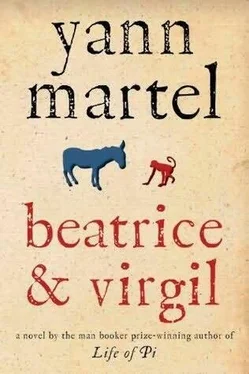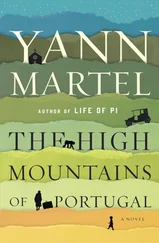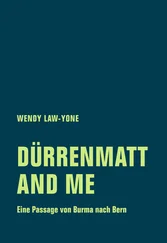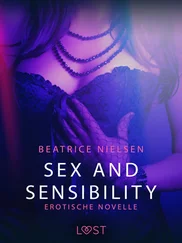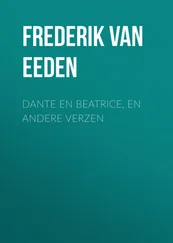Yann Martel - Beatrice and Virgil
Здесь есть возможность читать онлайн «Yann Martel - Beatrice and Virgil» весь текст электронной книги совершенно бесплатно (целиком полную версию без сокращений). В некоторых случаях можно слушать аудио, скачать через торрент в формате fb2 и присутствует краткое содержание. Жанр: Современная проза, на английском языке. Описание произведения, (предисловие) а так же отзывы посетителей доступны на портале библиотеки ЛибКат.
- Название:Beatrice and Virgil
- Автор:
- Жанр:
- Год:неизвестен
- ISBN:нет данных
- Рейтинг книги:5 / 5. Голосов: 1
-
Избранное:Добавить в избранное
- Отзывы:
-
Ваша оценка:
- 100
- 1
- 2
- 3
- 4
- 5
Beatrice and Virgil: краткое содержание, описание и аннотация
Предлагаем к чтению аннотацию, описание, краткое содержание или предисловие (зависит от того, что написал сам автор книги «Beatrice and Virgil»). Если вы не нашли необходимую информацию о книге — напишите в комментариях, мы постараемся отыскать её.
A famous author receives a mysterious letter from a man who is a struggling writer but also turns out to be a taxidermist, an eccentric and fascinating character who does not kill animals but preserves them as they lived, with skill and dedication – among them a howler monkey named Virgil and a donkey named Beatrice…
Beatrice and Virgil — читать онлайн бесплатно полную книгу (весь текст) целиком
Ниже представлен текст книги, разбитый по страницам. Система сохранения места последней прочитанной страницы, позволяет с удобством читать онлайн бесплатно книгу «Beatrice and Virgil», без необходимости каждый раз заново искать на чём Вы остановились. Поставьте закладку, и сможете в любой момент перейти на страницу, на которой закончили чтение.
Интервал:
Закладка:
Henry looked at the people around him. Lone individuals, couples, families with children, groups; of every race and ethnicity; reading, sleeping, chatting, jogging, playing, walking their dogs-people varied yet at peace with one another. A peacetime park on a sunny day. What need was there to talk about the Holocaust here? If he found some Jews amidst this peaceable gaggle, would they care to have him gore their beautiful day with talk of genocide? Would anyone care to have a stranger come up to them whispering, "Hitlerauschwitzsixmillionincandescentsoulsmygodmygodmygod"? And hell, Henry wasn't even Jewish, so why didn't he mind his own business? Everything is context, and clearly the context was wrong. Why write a novel about the Holocaust today? The matter is settled. Primo Levi, Anne Frank and all the others have done it well and for all time. "Let go, let go, let go," Henry intoned. A young man in sandals walked by. Flip-flop, flip-flop, flip-flop went his feet, like the bookseller's damning conclusion. "Let go, let go, let go," Henry intoned.
After an hour or so, he made his way to the edge of the park. A sign informed him he was in Hyde Park. The irony struck him. He had entered the park like Mr. Hyde of Stevenson's tale, deformed by anger, wilfulness and resentment, but he was leaving it more like the good Dr. Jekyll.
Henry realized then what answer he should have given the historian. His flip book was about having his soul ripped out and with it, attached, his tongue. Wasn't that what every Holocaust book was about, aphasia? Henry remembered a statistic: fewer than two percent of Holocaust survivors ever write about or testify to their ordeal. Thus the typical approach of those who do speak about it, so precise and factual, like a stroke victim who's learning how to speak again and who starts with the simplest, clearest syllables. For his part, Henry now joined the vast majority of those who had been shut up by the Holocaust. His flip book was about losing his voice.
And so Henry left Hyde Park no longer a writer. He stopped writing; the urge left him. Was this a case of writer's block? He argued later with Sarah that it wasn't, since a book had been written-two, in fact. It was more accurate to call it writer's abandonment. Henry simply gave up. But if he did not write, he would at least live. A stroll in a London park and an encounter with a beautiful tree at least taught him that useful lesson: if you are pitched into misery, remember that your days on this earth are counted and you might as well make the best of those you have left.
Henry returned to Canada and convinced Sarah they needed a break and a change of scenery. The lure of adventure won her over. In short order, she quit her job, they filled out papers, packed up their things, and moved abroad. They settled in one of those great cities of the world that is a world unto itself, a storied metropolis where all kinds of people find themselves and lose themselves. Perhaps it was New York. Perhaps it was Paris. Perhaps it was Berlin. To that city Henry and Sarah moved because they wanted to live to its pulse for a time. Sarah, who was a nurse, got a work visa and found employment in an addictions clinic. Henry, a resident alien, a rightless ghost, went about filling the parts of his life that were now empty of writing.
He took music lessons, reviving memories (but, alas, few skills) of playing as a teenager. He first tried his hand at the bassoon, but the double reed and the crazy arrangement of the finger holes defeated him. He returned to the clarinet, whose emotional range, from the riotous to the stately, he had not suspected when he was younger. He found a good teacher, an older gentleman, patient, intuitive and funny. The man told Henry that the only native talent needed to play music well was joy. Once, when Henry was labouring on Mozart's clarinet concerto, the teacher interrupted him and said, "Where's the lightness? You've turned Mozart into a heavy, black ox and you're ploughing a field with him." With that, he picked up his own clarinet and produced a burst of music that was so loud, clear and brilliant, a wild storm of gyring notes, that Henry was stunned. It was an aural version of Marc Chagall, with goats, brides, grooms and horses swirling about in a multicoloured sky, a world without gravity. Then the teacher stopped playing, and the sudden emptiness in the room nearly sucked Henry forward. He looked at his own clarinet. The teacher must have seen the expression on Henry's face. "Don't worry," he said. "It's just a question of practice. You'll be there in no time." Henry got back behind his black ox and plodded on. His teacher smiled and closed his eyes and nodded, muttering, "That's nice, that's nice," as if Henry's ox had taken flight.
Again capitalizing on buried youthful knowledge, Henry signed up for Spanish lessons. His mother tongue was French, and the good fortunes of his childhood, his being the son of roving Canadian foreign service officers, had led him to learn English and German with complete fluency. Only Spanish had not fully fit into his brain in those young learning years. He had lived in Costa Rica as a child for three years, but had attended an English school. On the streets of San Jose, he learned the outer form of Spanish, its colour, but not the canvas that supported it. As a result, his pronunciation and idioms were good, while his grammatical knowledge was not. He sought to remedy this lack by taking lessons with a dreamy Spanish graduate student who was doing a Ph.D. in history.
That Henry had chosen to write in English raised a number of eyebrows in his native land. It was, he explained, un hasard . If you go to school in English and in German, you learn to think in English and in German, and then you naturally start to write in English and in German. His first creative scribblings-highly personal efforts never meant to see the light of publication-had been in German, he told bemused journalists. Its crunchy pronunciation, clear phonetic spelling, secret-code grammar and architectural syntax endlessly pleased him. But as he grew more ambitious, he explained, it became patently absurd for a Canadian writer to be writing in German. Das ist doch verruckt! He switched to English. Colonialism is a terrible bane for a people upon whom it is imposed, but a blessing for a language. English's drive to exploit the new and the alien, its zeal in robbing words from other languages, its incapacity to feel qualms over the matter, its museum-size overabundance of vocabulary, its shoulder-shrug approach to spelling, its don't-worry-be-happy concern for grammar-the result was a language whose colour and wealth Henry loved. In his entirely personal experience of them, English was jazz music, German was classical music, French was ecclesiastical music, and Spanish was the music from the streets. Which is to say, stab his heart and it would bleed French, slice his brain open and its convolutions would be lined with English and German, and touch his hands and they would feel Spanish. But all this, as an aside.
Henry also joined a respected amateur theatre group. Under an inspired director, the group took its endeavours very seriously. Those were some of Henry's fondest memories of the city, those weeknight rehearsals in which he and his fellow amateur actors slowly brought Pinter and Ibsen and Pirandello and Soyinka to life, leaving their lives at the door and becoming, as best they could, someone else onstage. The fraternity among these dedicated thespians was priceless, and the reaching for emotional heights and depths, for experiences that were vicarious but powerful, was highly instructive in the way great art can be. With each play Henry felt he had lived an extra life, with its attendant portion of wisdom and folly.
After their move, it happened on a few occasions that Henry awoke in the middle of the night, tiptoed out of the bedroom to the computer, and summoned his book onto the screen to wrestle with it. He shortened the essay by half. He hunted down rogue adjectives and adverbs in the novel. He reworked some scenes and sentences over and over. But no matter what he tried, it was still the same doubly flawed book. In a few months, the fruitless urge to revise and resuscitate went away entirely. He even stopped replying to emails from his agent and editors. Sarah suggested gently that he was perhaps depressed. She encouraged him to keep busy. And though this is jumping ahead-and telling an entirely different story-Sarah in time became pregnant and brought into Henry's life a first child, a baby boy. Theo. Beholding him, astounded as he'd never been before, Henry decided that his son would become his pen and by force of being a good, loving father he would write a beautiful life story with him. If Theo was the only pen Henry ever wielded again, so be it.
Читать дальшеИнтервал:
Закладка:
Похожие книги на «Beatrice and Virgil»
Представляем Вашему вниманию похожие книги на «Beatrice and Virgil» списком для выбора. Мы отобрали схожую по названию и смыслу литературу в надежде предоставить читателям больше вариантов отыскать новые, интересные, ещё непрочитанные произведения.
Обсуждение, отзывы о книге «Beatrice and Virgil» и просто собственные мнения читателей. Оставьте ваши комментарии, напишите, что Вы думаете о произведении, его смысле или главных героях. Укажите что конкретно понравилось, а что нет, и почему Вы так считаете.
